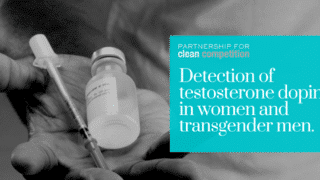Please note: The below call for papers is not related in any way to the Partnership for Clean Competition, our programs, or #PCC2019. Please reach out to the event organizers via the link below if you would like additional information on this opportunity.
Call for papers: 4th International Conference on Public Policy, 26 –28 June 2019, Montreal
Panel T17P07: Measuring the Effectiveness of Anti-Doping Policy
The upcoming 4th International Conference on Public Policy (ICPP) will include a panel on anti-doping policy entitled “Measuring the Effectiveness of Anti-Doping Policy”. The ICPP is the world leading academic conference on Public Policy. It will take place at Concordia University, Montreal, from 26 to 28 June 2019. This is a unique opportunity to present research papers on anti-doping policy to a large audience of academics and experts.
The call for papers is now open until 30 January 2019.
Please follow this link to find out more and submit your proposal: http://www.ippapublicpolicy.org//conference/icpp4/10.
Co-chairs:
Bertrand Stoffel, Postdoctoral Fellow, Institute for Health and Social Policy and Faculty of Law, McGill University
Lindsay Duncan, Assistant Professor, Kinesiology and Physical Education, McGill University
Arijit Nandi, Associate Professor, Canada Research Chair in Political Economy of Health, Department of Epidemiology, Biostatistics and Occupational Health, McGill University
Call for papers:
Anti-doping policy is one of the most important international sport policies. According to the World Anti-Doping Agency, more than 660 sport organizations have accepted and implemented the World Anti-Doping Code, including all international sport federations, all national Olympic committees, as well as national anti-doping agencies in more than 140 countries. Yet very few attempts have been made to evaluate the outcomes, the quality and the efficiency of anti-doping policy. This panel will thus address a fundamental question: How can we measure the effectiveness of anti-doping policy? That is, what methods and measurements should be used to understand the impact of anti-doping policy as well as the underlying rationale for such policies? There are numerous challenges. One challenge is to establish the fundamental justifications for anti-doping policy. Another is to better understand what anti-doping policy should achieve, how the effectiveness of anti-doping policy should be studied and what exactly should be measured. Yet another challenge is to understand how findings from such studies can be applied to better serve the goals of anti-doping policy.
This panel calls for papers that employ different approaches to measure the effectiveness of anti-doping policy and/or critically address the various justifications for anti-doping policy. Papers may approach the research question from two main perspectives: the prevalence and causes for doping, and the application of evidence from such research to anti-doping policy. The call is broad in scope and papers may address the research question from the perspective of anti-doping policy as a whole or be limited to some aspects of it (e.g. education programs, specific testing methods, etc.), they may approach the question locally or internationally, and study all types and levels of sports, including recreational sport. Because the aim of this panel is to organise the debate around these questions, this call encourages submissions from various disciplines, including epidemiology, social sciences, law, ethics and bioethics, as well as biology, chemistry and biochemistry. Where applicable, papers may use quantitative, qualitative, or mixed methodologies. In an effort to facilitate the discussion across disciplines, the panel specifically invites researchers whose studies address the effectiveness of testing methods and protocols to submit their applications.
Some specific areas of interest for this panel include the following:
- Papers can explore the impact and the deterrence effect of anti-doping policy, critically assess existing data and present ways to collect data on doping;
- Papers can also look at doping prevention and education programs and measure their effects on behaviour and intention to dope;
- Further, papers can inquire about the perception by athletes and other persons involved in sports of the effectiveness and justifications of anti-doping policy;
- Papers may also discuss techniques and tools for modifying athletes’ behaviour, including harm reduction or legalization;
- Finally, papers can focus on the nature of doping and the target of anti-doping interventions. Specifically, these papers may critically explore the concept of doping and the fundamental rationale for anti-doping policy, as well as how such conceptual shifts may affect the way anti-doping policy is measured and evaluated.



